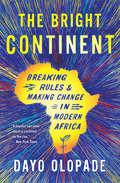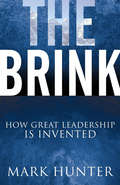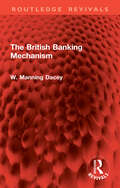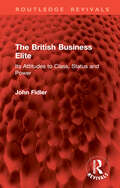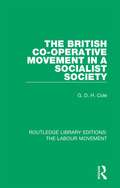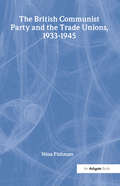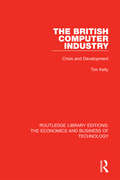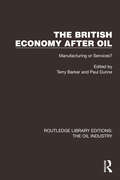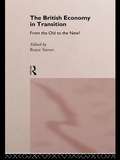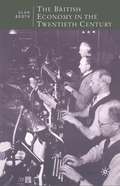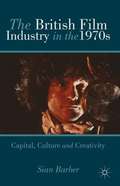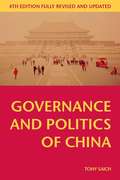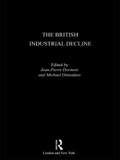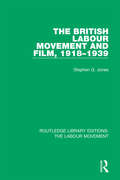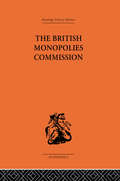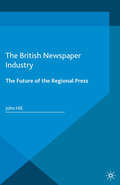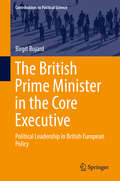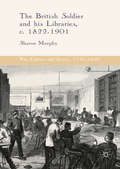- Table View
- List View
The Brigham and Women's Hospital Innovation Hub: Driving Internal Innovation
by Robert S. Huckman Ariel D. SternCase
The Bright Continent: Breaking Rules & Making Change in Modern Africa
by Dayo Olopade&“For anyone who wants to understand how the African economy really works, The Bright Continent is a good place to start&” (Reuters). Dayo Olopade knew from personal experience that Western news reports on conflict, disease, and poverty obscure the true story of modern Africa. And so she crossed sub-Saharan Africa to document how ordinary people deal with their daily challenges. She found what cable news ignores: a continent of ambitious reformers and young social entrepreneurs driven by kanju—creativity born of African difficulty. It&’s a trait found in pioneers like Kenneth Nnebue, who turned cheap VHS tapes into the multimillion-dollar film industry Nollywood. Or Ushahidi, a technology collective that crowdsources citizen activism and disaster relief. A shining counterpoint to conventional wisdom, The Bright Continent rewrites Africa&’s challenges as opportunities to innovate, and celebrates a history of doing more with less as a powerful model for the rest of the world. &“[An] upbeat study of development in Africa . . . The book is written more in wonder at African ingenuity than in anger at foreign incomprehension.&” —The New Yorker &“A hopeful narrative about a continent on the rise.&” —The New York Times Book Review
The Brilliant Boy: Doc Evatt and the Great Australian Dissent
by Gideon HaighIn a quiet Sydney street in 1937, a seven year-old immigrant boy drowned in a ditch that had filled with rain after being left unfenced by council workers. How the law should deal with the trauma of the family&’s loss was one of the most complex and controversial cases to reach Australia&’s High Court, where it seized the imagination of its youngest and cleverest member. These days, &‘Doc&’ Evatt is remembered mainly as the hapless and divisive opposition leader during the long ascendancy of his great rival Sir Robert Menzies. Yet long before we spoke of &‘public intellectuals&’, Evatt was one: a dashing advocate, an inspired jurist, an outspoken opinion maker, one of our first popular historians and the nation&’s foremost champion of modern art. Through Evatt&’s innovative and empathic decision in Chester v the Council of Waverley Municipality, which argued for the law to acknowledge inner suffering as it did physical injury, Gideon Haigh rediscovers the most brilliant Australian of his day, a patriot with a vision of his country charting its own path and being its own example – the same attitude he brought to being the only Australian president of the UN General Assembly, and instrumental in the foundation of Israel. A feat of remarkable historical perception, deep research and masterful storytelling, The Brilliant Boy confirms Gideon Haigh as one of our finest writers of non-fiction. It shows Australia in a rare light, as a genuinely clever country prepared to contest big ideas and face the future confidently. 'Here is a master craftsman delivering one of his most finely honed works. Meticulous in its research, humane in its storytelling, The Brilliant Boy is Gideon Haigh at his lush, luminous best. Haigh shines a light on person, place and era with the sheer force of his intellect and the generosity of his words. The Brilliant Boy is simply a brilliant book.' Clare Wright, Stella-Prize winning author of The Forgotten Rebels of Eureka 'Gideon Haigh is one of Australia&’s most versatile and skilled historians.' Geoffrey Blainey 'This new biography of HV Evatt lifts the lid on his early life as a brilliant barrister and creative Justice of the High Court of Australia. It reveals the wellsprings that gave birth to his humanitarian and internationalist values that later helped in the creation of the United Nations. It helps to explain Evatt's valiant defence of liberty in fighting off the attempt to ban the communists in Australia. We need to constantly renew our acquaintance with such values. This book reminds us of Evatt's flawed genius but deep motivations, lest we ever forget.' The Hon Michael Kirby AC CMG
The Brink: How Great Leadership is Invented
by Mark HunterThe Brink is a method for generating leadership in an individual leader and on a team. It is based on the simple assertion that leadership is created in the face of some great challenge or obstacle to overcome, rather than in a vacuum or in comfortable places with no adversity. The Brink model uses climbing a mountain as an analogy throughout for creating that big challenge or goal, and then demonstrates how to create a team to climb it with and outlines the way to create leadership in everyone involved in the process. This metaphor transfers to virtually any leadership position one holds and is organized into a clear list of ingredients essential to leadership.
The British Abroad Since the Eighteenth Century, Volume 1
by Martin Farr Xavier Gu�ganThis book considers the British travelling beyond their isles over the last three hundred years, and through a range of interdisciplinary perspectives reflects on their taste for discovery and self-discovery both through the exploration - and exploitation - of other lands and peoples.
The British Banking Mechanism (Routledge Revivals)
by W. Manning DaceyFirst published in 1951, The British Banking Mechanism seeks to enable the reader to obtain a real understanding of the British financial system as it operated back in the 1950s.The book shows how the traditional concept of the Bank of England as the supreme monetary authority controlling the volume of credit has to be modified now that the government, instead of private industry, is the chief borrower from the banking system. This book is of historical importance for scholars and students of banking history, British banking and British economics.
The British Business Elite: Its Attitudes to Class, Status and Power (Routledge Revivals)
by John FidlerFirst published in 1981, The British Business Elite is a study of the attitudes to class, status and power of top businessmen in Great Britain, based upon first-hand interviews with chairmen, chief executives and other directors of Britain’s largest industrial, banking and insurance companies: men of genuine wealth and power. Dr Fidler produces important empirical data in a field of study which has been plagued with problems of access; a field in which much of the theory has been based on assumptions.The book includes a careful examination of the background and career of those interviewed; a discussion of the way in which businessmen see the objectives of their companies, particularly relevant to the long-standing debate over the ownership and control of corporations; their views of class and status and of the power of businessmen in Britain. Finally, Dr Fidler considers the implications of the research for future theory and investigation.
The British Co-operative Movement in a Socialist Society (Routledge Library Editions: The Labour Movement #9)
by G. D. ColeFirst published in 1951. The purpose of this study was to consider the prospects of the British Co-operative movement in all its main aspects and not as a consumers’ movement only. The author examines ways in which the Co-operative enterprise, in its various forms, could best be fitted into the economic structure of the coming society. This title will be of great interest to scholars and students of labour history.
The British Coal Industry (Routledge Library Editions: Energy Economics)
by H. Townshend-RoseOriginally published in 1951, this book is a straightforward account of the British nationalized coal industry in the first half of the twentieth century. An introductory chapter gives the history of the industry during the inter-war years and subsequent chapters discuss the complex organization by which coal is marketed at home and overseas. The types and grades of coal and the price structure of the industry are considered. There is a section on finance which explains the capital structure of the industry and statistical charts focus on significant trends in output, man-power, absenteeism, accidents and similar vital features of the coal industry.
The British Communist Party and the Trade Unions, 1933–1945
by Nina FishmanThis is a pathbreaking book, essential reading for students of interwar political and social history. Previous histories of the period have underestimated the crucial role which Communists played in trade union organisation from top to bottom. Despite its relatively small size the Communist Party occupied a strategic place in the trade union movement: the leaders of the movement, notably Ernest Bevin, refused to acknowledge this at the time. Thanks to her extensive research and numerous interviews, and to the ’opening of the books’ of the Communist Part, Nina Fishman has been able to uncover a fascinating story, one which official Communist historians have never told, and which other historians could only recount in fragments. The main protagonists are the Communist Party General Seretary, Harry Pollitt, and the Editor of the Daily Worker, Johnny Campbell. The book brings to vivid life the work of activists on the shop floor and in the coalmines during the Depression and the Second World War. The book includes the first comprehensive analysis of Communist activity in key sectors of the British economy, notably in engineering shop stewards’ movements and among London busmen. It concludes with an authoritative review of Communists' part in the British war economy and a vigorous challenge to the conventional wisdom about the effect of Communist Party changes of line on the war on activists’ abilities to incite and lead strikes.
The British Computer Industry: Crisis and Development (Routledge Library Editions: The Economics and Business of Technology #23)
by Tim KellyOriginally published in 1987, this book explores the history and geography of the computer industry in Britain and the evolution of the market leader firms, STC ICL and IBM (UK). It also examines the rising rate of new firm formation in the 1980s and the technology policies adopted by successive governments and analyses how well the industry is placed to cope with the challenges of technological change and increased international competition.
The British Economy After Oil: Manufacturing or Services? (Routledge Library Editions: The Oil Industry #1)
by Terry BarkerThe British Economy After Oil (1988) examines the future paths for the British economy as North Sea oil runs out. It considers the argument that the future lies in the promotion and growth of services, as well as the counter-argument that the future lies with the development of a strong manufacturing base for the economy.
The British Economy in Transition: From the Old to the New?
by Royce TurnerThe British Economy in Transition: From the Old to the New? examines attempts at economic regeneration in areas that have experienced the decline in 'traditional' industry of recent years. The contributors also look at the impact of techno and managerial modernization strategies in industries that have survived, but have had to adapt rapidly to do
The British Economy in the Twentieth Century
by Alan BoothIt is commonplace to assume that the twentieth-century British economy has failed, falling from the world's richest industrial country in 1900 to one of the poorest nations of Western Europe in 2000. Manufacturing is inevitably the centre of this failure: British industrial managers cannot organise the proverbial 'knees-up' in a brewery; British workers are idle and greedy; its financial system is uniquely geared to the short term interests of the City rather than of manufacturing; its economic policies areperverse for industry; and its culture is fundamentally anti-industrial. There is a grain of truth in each of these statements, but only a grain. In this book, Alan Booth notes that Britain's living standards have definitely been overtaken, but evidence that Britain has fallen continuously further and further behindits major competitors is thin indeed. Although British manufacturing has been much criticised, it has performed comparatively better than the service sector. The British Economy in the Twentieth Century combines narrative with a conceptual and analytic approach to review British economic performance during the twentieth century in a controlled comparative framework. It looks at key themes, including economic growth and welfare, the working of the labour market, and the performance of entrepreneurs and managers. Alan Booth argues that a careful, balanced assessment (which must embrace the whole century rather than simply the post-war years) does not support the loud and persistent case for systematic failure in British management, labour, institutions, culture and economic policy. Relative decline has been much more modest, patchy and inevitable than commonly believed.
The British Electricity Experiment: Privatization: the record, the issues, the lessons (Energy and Infrastructure Set)
by John SurreyIn 1990, energy in the UK underwent a unique and fundamental transformation, with the privatization of the electricity supply industry. This is the first book to fully assess the experiment. It first explains how – and why – the British electricity supply industry was privatized. It then identifies the subsequent changes in electricity prices, profits, employment, investment, nuclear power and renewable, and the extent to which each of these was due solely to privatization or to other factors, or could have come about by reform of the previous model, rather than privatization. Finally, the authors analyse the key unresolved issues of regulation, introducing competition into the domestic energy market in 1998, supply security, and other long-term strategic considerations. Throughout, the distinguish between the uniquely British elements of the experience and those which can be drawn upon by other countries embarking upon similar reforms. Today, governments throughout the world are looking to the UK's experience as a potential prototype for the restructure of their own electricity supply industries. For them, and for electricity utilities, fuel and power plant suppliers, regulation authorities, financial analysts, international agencies, journalists and academics alike, this thorough and pragmatic study will be essential reading. 'This is likely to become the definitive book on the first six years of the great British electricity experiment' Walt Patterson The British Electricity Experiment is the result of a detailed study undertaken by the Energy Programme at the science Policy Research unit (SPRU). Professor John Surrey was head of SPR's Energy Programme between 1969 and 1986. He has worked with the central Electricity Generating Board, as a government Economic Adviser, and as a Specialist Adviser to numerous House of Commons Select Committee inquiries on energy matters. Originally published in 1996
The British Film Industry in the 1970s
by Sian BarberIs there more to 1970s British cinema than sex, horror and James Bond? This lively account argues that this is definitely the case and explores the cultural landscape of this much maligned decade to uncover hidden gems and to explode many of the well-established myths about 1970s British film and cinema.
The British Growth Crisis
by Colin Hay Peter Taylor-Gooby Jeremy GreenBritain remains mired in the most severe and prolonged economic crisis that it has faced since the 1930s. What would it take to find a new, more stable and more sustainable growth model for Britain in the years ahead? This important volume written by a number of influential commentators seeks to provide some answers.
The British Industrial Decline (Routledge Explorations in Economic History #10)
by Jean-Pierre Dormois Michael DintenfassThe decline of British Industry in the late Victorian and early Edwardian period is the subject of major concern to economic and modern British historians. This book sets out the present state of the discussion and introduces new directions in which the debate about the British decline is now proceeding: Among other themes, the book examines: * the role of the service sector alongside manufacturing * the distinctiveness of the British regions * the state's role in the British decline including an analysis of its responsibility for the maintenance and modernization of infrastructure * the association of aristocratic values with entrepreneurial vitality * how British historians have discussed success and failure, with a critique of the literature of decline.
The British Industrial Revolution in Global Perspective
by Robert C. AllenWhy did the industrial revolution take place in eighteenth-century Britain and not elsewhere in Europe or Asia? In this convincing new account Robert Allen argues that the British industrial revolution was a successful response to the global economy of the seventeenth and eighteenth centuries. He shows that in Britain wages were high and capital and energy cheap in comparison to other countries in Europe and Asia. As a result, the breakthrough technologies of the industrial revolution - the steam engine, the cotton mill, and the substitution of coal for wood in metal production - were uniquely profitable to invent and use in Britain. The high wage economy of pre-industrial Britain also fostered industrial development since more people could afford schooling and apprenticeships. It was only when British engineers made these new technologies more cost-effective during the nineteenth century that the industrial revolution would spread around the world.
The British Labour Movement and Film, 1918-1939 (Routledge Library Editions: The Labour Movement #18)
by Stephen G. JonesFirst published in 1987. Using a wealth of primary sources, Stephen Jones investigates the role played in cinema affairs by the Labour Movement, stressing the important contributions made by the Labour Party, Communist Party and trade unions in the production and presentation of film. He gives us a rare and important insight into the British film industry, examining the cinema in its wider economic, political and cultural context. He explores the ideological influence of film, the nature of film work, state intervention and Sunday entertainment, as reflected in the policies and attitudes of organized labour. Also discussed are the growth and impact of independent working class film organization.
The British Monopolies Commission
by Charles K. RowleyThis book is a key example of the emergence of public choice theory by an economist who was to become one of its major exponents. It combines a detailed, critical study of the Monopolies Commission, with an analysis of the economic issues involved in monopoly supervision and control.
The British Newspaper Industry: The Future of the Regional Press
by John HillIt is never very obvious to spectators of the newspaper business just why it is that the industry has suffered so badly in recent years. Most ascribe the reasons to the arrival of the Internet in all its forms when, in truth, most of its problems were created by the newspaper managements themselves, either by weak management in the control of its environment, by a serious lack of foresight in looking to the future, or by assuming that change, if it were to come, would be at the slow pace of past change. The magisterial attitudes of most newspaper managements served to engender a growing resentment particularly among the advertisers who were forced to pay increased rates to enable the cover prices of the publications to be held down. The British Newspaper Industry sets out to distinguish the newspaper industry from the generality of single product organisations and to provide tailored solutions to its problems by drawing on a variety of techniques and practices successfully used in other industries.
The British Prime Minister in the Core Executive: Political Leadership in British European Policy (Contributions to Political Science)
by Birgit BujardThis book examines the UK prime minister’s political leadership in the domestic executive. By offering a comparative study of the political leadership of James Callaghan, Margaret Thatcher, John Major and Tony Blair with regard to European monetary policy, it challenges the thesis that British prime ministers today have more power, resources and autonomy than their predecessors, giving them a greater capacity to act. Taking key European monetary policy decisions by the British government between 1976 and 2007 as empirical cases, the book assesses the extent to which the political leadership of each prime minister was affected by the cabinet, the parliamentary party as well as the media, and the extent to which he or she was able to manage these factors. It becomes clear from this analysis that prime ministerial predominance is not as frequent as suggested, while collective leadership does not represent a return to cabinet government. Moreover, particularly the party in government affects the prime minister’s leadership by shaping his or her options on appointments (and therefore the composition of the core executive), and through its behaviour in parliament, e.g. through rebellions or the threat of them.
The British Soldier and his Libraries, c. 1822-1901
by Sharon MurphyThe British Soldier and his Libraries, c. 1822-1901 considers the history of the libraries that the East India Company and Regular Army respectively established for soldiers during the nineteenth century. Drawing upon a wide range of material, including archival sources, official reports, and soldiers' memoirs and letters, this book explores the motivations of those who were responsible for the setting up and/or operation of the libraries, and examines what they reveal about attitudes to military readers in particular and, more broadly, to working-class readers - and leisure - at this period. Murphy's study also considers the contents of the libraries, identifying what kinds of works were provided for soldiers and where and how they read them. In so doing, The British Soldier and his Libraries, c. 1822-1901 affords another way of thinking about some of the key debates that mark book history today, and illuminates areas of interest to the general reader as well as to literary critics and military and cultural historians.
The British Tariff System (Routledge Library Editions: International Trade Policy #5)
by E.B. McGuireThe aim of this book, first published in 1939, is to provide a comprehensive description of the protectionist system that had been in force in Britain since 1931. It explains the principles and difficulties involved in framing and administering a customs and excise tariff, which has both revenue and political purposes. The problems of tariff negotiating are discussed, and trade agreements made are summarized.

